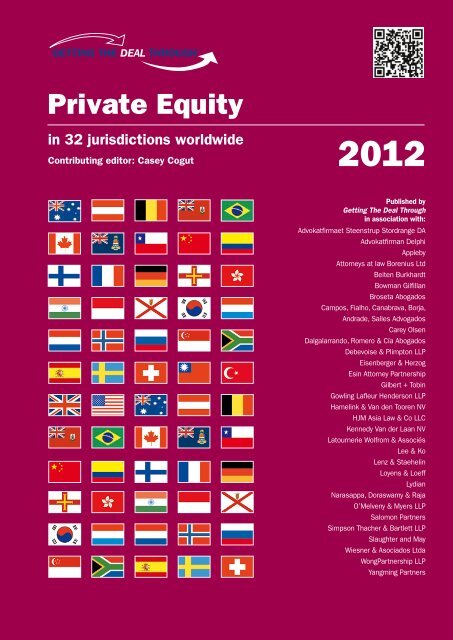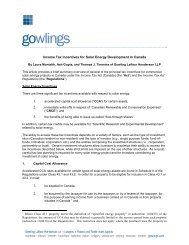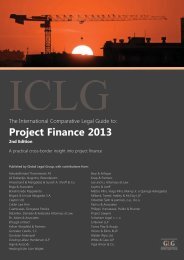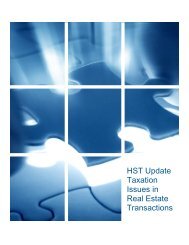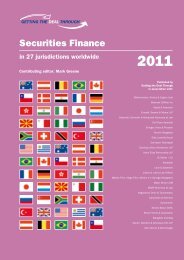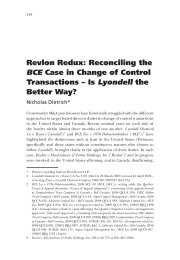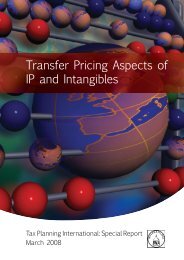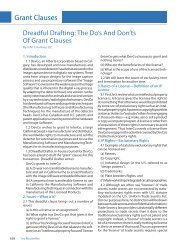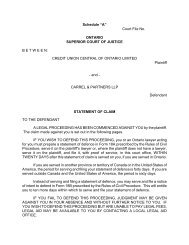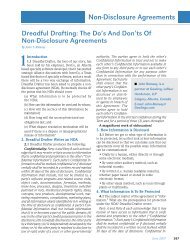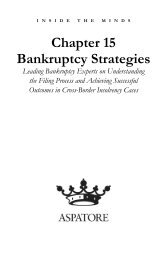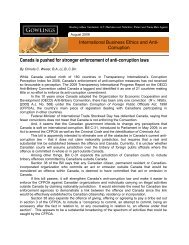Getting the Deal Through â Private Equity 2012 â Fund ... - Gowlings
Getting the Deal Through â Private Equity 2012 â Fund ... - Gowlings
Getting the Deal Through â Private Equity 2012 â Fund ... - Gowlings
- No tags were found...
Create successful ePaper yourself
Turn your PDF publications into a flip-book with our unique Google optimized e-Paper software.
®<strong>Private</strong> <strong>Equity</strong>in 32 jurisdictions worldwideContributing editor: Casey Cogut <strong>2012</strong>Published by<strong>Getting</strong> The <strong>Deal</strong> <strong>Through</strong>in association with:Advokatfirmaet Steenstrup Stordrange DAAdvokatfirman DelphiApplebyAttorneys at law Borenius LtdBeiten BurkhardtBowman GilfillanBroseta AbogadosCampos, Fialho, Canabrava, Borja,Andrade, Salles AdvogadosCarey OlsenDalgalarrando, Romero & Cía AbogadosDebevoise & Plimpton LLPEisenberger & HerzogEsin Attorney PartnershipGilbert + TobinGowling Lafleur Henderson LLPHamelink & Van den Tooren NVHJM Asia Law & Co LLCKennedy Van der Laan NVLatournerie Wolfrom & AssociésLee & KoLenz & StaehelinLoyens & LoeffLydianNarasappa, Doraswamy & RajaO’Melveny & Myers LLPSalomon PartnersSimpson Thacher & Bartlett LLPSlaughter and MayWiesner & Asociados LtdaWongPartnership LLPYangming Partners
contents®<strong>Private</strong> <strong>Equity</strong><strong>2012</strong>Contributing editor:Casey CogutSimpson Thacher & Bartlett LLPBusiness developmentmanagersAlan LeeGeorge IngledewRobyn He<strong>the</strong>ringtonDan WhiteMarketing managersEllie NotleyAlice HazardMarketing assistantsWilliam BentleyZosia DemkowiczAdmin assistantMegan FriedmanMarketing manager– subscriptionsRachel Nursesubscriptions@getting<strong>the</strong>dealthrough.comAssistant editorAdam MyersEditorial assistantLydia GergesSenior production editorJonathan CowieProduction editorMartin ForrestChief subeditorJonathan AllenSubeditorsCaroline RawsonSarah MorganDavet HylandEditor-in-chiefCallum CampbellPublisherRichard Davey<strong>Private</strong> <strong>Equity</strong> <strong>2012</strong>Published byLaw Business Research Ltd87 Lancaster RoadLondon, W11 1QQ, UKTel: +44 20 7908 1188Fax: +44 20 7229 6910© Law Business Research Ltd<strong>2012</strong>No photocopying: copyrightlicences do not apply.ISSN 1746-5524The information provided in thispublication is general and may notapply in a specific situation. Legaladvice should always be sought beforetaking any legal action based on <strong>the</strong>information provided. This informationis not intended to create, nor doesreceipt of it constitute, a lawyer–clientrelationship. The publishers andauthors accept no responsibility forany acts or omissions containedherein. Although <strong>the</strong> informationprovided is accurate as of February<strong>2012</strong>, be advised that this is adeveloping area.Printed and distributed byEncompass Print SolutionsTel: 0844 2480 112LawBusinessResearchGlobal Overview Casey Cogut, William Curbow, Kathryn King Sudol and Atif Azher Simpson Thacher & Bartlett LLP 3FUND FORMATIONAustralia Deborah Johns and Adam Laura Gilbert + Tobin 6Bermuda Sarah Demerling Appleby (Bermuda) Limited 13Brazil Luciano Fialho de Pinho, Clara Gazzinelli de Almeida Cruz and Bruno Ribeiro CarvalhoCampos, Fialho, Canabrava, Borja, Andrade, Salles Advogados 21Canada Myron B Dzulynsky, Vince F Imerti and Bryce A Kraeker Gowling Lafleur Henderson LLP 28Cayman Islands Bryan Hunter and Richard Addlestone Appleby (Cayman) Ltd 34Chile Felipe Dalgalarrando H Dalgalarrando, Romero & Cía Abogados 41China Caroline Berube HJM Asia Law & Co LLC 48Finland Paulus Hidén and Einari Karhu Attorneys at Law Borenius Ltd 55Germany Thomas Sacher, Michael Schmidt and Steffen Schniepp Beiten Burkhardt 60Guernsey Ben Morgan, Geoff Ward-Marshall and Emma Penney Carey Olsen 67India Siddharth Raja and Chitra Raghavan Narasappa, Doraswamy & Raja 74Jersey Robert Milner and James Mulholland Carey Olsen 82Luxembourg Marc Meyers Loyens & Loeff 87Ne<strong>the</strong>rlands Hans van Ramshorst, Floor Veltman, Louis Bouchez and Maurits Bos Kennedy Van der Laan NVJan van den Tooren and Reinier Noort Hamelink & Van den Tooren NV 96Singapore Low Kah Keong and Felicia Marie Ng WongPartnership LLP 104Spain Julio Veloso and Javier Morera Broseta Abogados 110Sweden Anders Lindström and Mikael Knutsson Advokatfirman Delphi 124Switzerland Shelby R du Pasquier and Philipp Fischer Lenz & Staehelin 117United Kingdom Anthony McWhirter and Richard Ward Debevoise & Plimpton LLP 131United States Thomas H Bell, Barrie B Covit, Jason A Herman, Jonathan A Karen, Glenn R Sarno and Michael W WolitzerSimpson Thacher & Bartlett LLP 138TRANSACTIONSAustralia Rachael Bassil and Peter Cook Gilbert + Tobin 148Austria Marco Steiner and Marcus Benes Eisenberger & Herzog 155Belgium Peter De Ryck Lydian 160Brazil Luciano Fialho de Pinho and Flávio Santana Cançado Ribeiro and Bruno Vieira LavallCampos, Fialho, Canabrava, Borja, Andrade, Salles Advogados 167Canada Harold Chataway, Daniel Lacelle, Ian Macdonald and Jason A Saltzman Gowling Lafleur Henderson LLP 173Cayman Islands Stephen James, Simon Raftopoulos and Samuel Banks Appleby (Cayman) Ltd 181Chile Felipe Dalgalarrando H Dalgalarrando, Romero & Cía Abogados 185China Caroline Berube HJM Asia Law & Co LLC 191Colombia Mauricio Rodríguez and Eduardo A Wiesner Wiesner & Asociados Abogados 200Finland Maria Carlsson, Andreas Doepel, Antti Hemmilä, Ari Kaarakainen, Sanna Lindqvist and Jukka LeskinenAttorneys at law Borenius Ltd 205France Pierre Lafarge, Jean-Luc Marchand and Claire Langelier Latournerie Wolfrom & Associés 211Germany Thomas Sacher, Michael Schmidt and Steffen Schniepp Beiten Burkhardt 218Hong Kong Benita Yu and Clara Choi Slaughter and May 224India Siddharth Raja and Neela Badami Narasappa, Doraswamy & Raja 231Indonesia Joel Hogarth O’Melveny & Myers LLP 239Korea Je Won Lee and Geen Kim Lee & Ko 245Ne<strong>the</strong>rlands Hans van Ramshorst, Floor Veltman, Louis Bouchez and Maurits Bos Kennedy Van der Laan NVJan van den Tooren and Reinier Noort Hamelink & Van den Tooren NV 251Norway Susanne Schneider and Odd Moe Advokatfirmaet Steenstrup Stordrange DA 258Russia Anton Klyachin and Igor Kuznets Salomon Partners 264Singapore Wai King Ng and Kenneth Leong Tay WongPartnership LLP 270South Africa Lele Modise, Mogola Makola and Hannine Drake Bowman Gilfillan 278Spain Julio Veloso and Javier Morera Broseta Abogados 289Sweden David Aversten, Clas Romander, Michael Juhlin and Fredrik Mörner Advokatfirman Delphi 295Switzerland Shelby R du Pasquier and Philipp Fischer Lenz & Staehelin 303Taiwan Robert C Lee, Claire Wang and Candace Chiu Yangming Partners 309Turkey Ismail G Esin Esin Attorney Partnershp 315United Kingdom David Innes, Guy Lewin-Smith and Daisy Raven Debevoise & Plimpton LLP 321United States William Curbow, Kathryn King Sudol and Atif Azher Simpson Thacher & Bartlett LLP 327www.getting<strong>the</strong>dealthrough.com
FUND FORMATIONCanadaCanadaMyron B Dzulynsky, Vince F Imerti and Bryce A KraekerGowling Lafleur Henderson LLPGowling Lafleur Henderson LLPFormation and terms operation1 Forms of vehicleWhat legal form of vehicle is typically used for private equity fundsformed in your jurisdiction? Does such a vehicle have a separate legalpersonality or existence under <strong>the</strong> law of your jurisdiction? In ei<strong>the</strong>rcase, what are <strong>the</strong> legal consequences for investors and <strong>the</strong> manager?The most common, if not sole, vehicle for a private equity fund inCanada is a limited partnership. For <strong>the</strong> purposes of this article, it isassumed that, in all cases, <strong>the</strong> form of vehicle is a limited partnership.Limited partnerships are formed under provincial laws. The specificcharacteristics of a limited partnership (including matters such as creationformalities and disclosure of limited partners’ names) is dependent,in part, on <strong>the</strong> applicable laws of <strong>the</strong> province of formation. Alimited partnership generally does not have status as a separate legalentity in Canada, although for certain purposes it is treated as if ithas similar characteristics to such an entity.A limited partnership is required to have at least one general partnerand at least one limited partner. Any type of entity can be ei<strong>the</strong>r alimited partner or a general partner. A general partner’s liability in alimited partnership is unlimited. As such, a special purpose corporationor management limited partnership is normally formed to actas <strong>the</strong> general partner. The liability of a limited partner generally islimited to its capital, as fur<strong>the</strong>r described below.Depending upon <strong>the</strong> management structure of a fund and relateddetails, fur<strong>the</strong>r securities law formalities may also apply. To <strong>the</strong> extentthat a manager needs to make formal securities law filings, timing forsuch filings needs to be contemplated, though it need not in practicedelay <strong>the</strong> formation of <strong>the</strong> limited partnership. Fur<strong>the</strong>r details as tosecurities law matters are set out below.In addition to securities laws, a number of Canadian provincestreat an offering of limited partnership interests in such jurisdiction ascarrying on business in such province, <strong>the</strong>reby triggering a pro formaextra-provincial registration filing in such jurisdiction.While <strong>the</strong> formal formation process is unlikely to be overly costlyor time intensive (subject to <strong>the</strong> caveats noted above), a significantamount of time is typically spent on disclosure documentation (usuallyan offering, information or private placement memorandum),attracting investors, negotiating terms and conditions of contributionsand drafting appropriate documentation giving effect to <strong>the</strong>intentions of <strong>the</strong> parties. Fees are mainly driven by <strong>the</strong> costs of preparingand, to <strong>the</strong> extent applicable, negotiating such documents, aswell as <strong>the</strong> overall complexity of <strong>the</strong> fund, any parallel fund structuresand underlying acquisition structures below <strong>the</strong> fund. Lawyers typicallyare involved in negotiating and drafting <strong>the</strong> limited partnershipagreement, though financial, accounting and o<strong>the</strong>r advisers may alsobe involved.There are no minimum capital requirements for limitedpartnerships.2 Forming a private equity fund vehicleWhat is <strong>the</strong> process for forming a private equity fund vehicle in yourjurisdiction?A limited partnership is generally created when a fund sponsor’slegal counsel files a declaration or certificate of limited partnershipwith <strong>the</strong> relevant provincial department. The form and <strong>the</strong>details required in connection with this filing vary from provinceto province. While <strong>the</strong>re are different approaches, fund sponsorsor <strong>the</strong>ir special purpose general partner entities often enterinto a short pro forma limited partnership agreement with aninitial (usually related) limited partner, <strong>the</strong>n register <strong>the</strong> limitedpartnership so that it can proceed to market to investors. If anon-Canadian general partner is contemplated, <strong>the</strong> formation processmay be delayed by <strong>the</strong> requirement (and inherent processing time)to extra-provincially license <strong>the</strong> foreign general partner to carry onbusiness in <strong>the</strong> jurisdiction of <strong>the</strong> limited partnership’s formation.As <strong>the</strong> offering of limited partnership interests to investorsis subject to applicable provincial securities laws, prospectusand registration requirements must also be satisfied. Typically,private equity limited partnership interests are intended for ‘accredited’investors, and such interests are not intended to be publiclytraded. Consequently, statutory exemptions from <strong>the</strong> prospectusrequirements are generally available, though pro forma filings(with more than nominal fees in some cases) may be required.3 RequirementsIs a private equity fund vehicle formed in your jurisdiction required tomaintain locally a custodian or administrator, a registered office, booksand records or a corporate secretary, and how is that requirementtypically satisfied?Except as noted below, <strong>the</strong>re are no such legal requirements, thoughin practice ei<strong>the</strong>r <strong>the</strong> general partner or <strong>the</strong> manager of <strong>the</strong> fundmay fulfil such role. Most Canadian provinces do, however, require alimited partnership ei<strong>the</strong>r formed under <strong>the</strong> laws of such province orextra-provincially registered in such province to maintain within <strong>the</strong>province a registered office, place of business or attorney for serviceor o<strong>the</strong>r representative, as well as basic records such as <strong>the</strong> names,addresses and amount contributed or agreed to be contributed bylimited partners.4 Access to informationWhat access to information about a private equity fund formed inyour jurisdiction is <strong>the</strong> public granted by law? How is it accessed?If applicable, what are <strong>the</strong> consequences of failing to make suchinformation available?Most Canadian jurisdictions require a limited partnership tomaintain a current record of its limited partners and <strong>the</strong> amountcontributed or agreed to be contributed by each limited partner.28 <strong>Getting</strong> <strong>the</strong> <strong>Deal</strong> <strong>Through</strong> – <strong>Private</strong> <strong>Equity</strong> <strong>2012</strong>
Gowling Lafleur Henderson LLPSuch information is often generally available to certain third partiesupon request. Failure to make this information available may resultin a fine. In some provinces, information relating to <strong>the</strong> identity oflimited partners may be available on <strong>the</strong> public record, and <strong>the</strong> failureto file such information could adversely affect <strong>the</strong> partnership’sstatus. Generally, unless <strong>the</strong> fund’s limited partnership interests arebeing offered to <strong>the</strong> public by prospectus (as a result of which <strong>the</strong>limited partnership generally would not be viewed as a private equitylimited partnership), <strong>the</strong> limited partnership agreement would beavailable only to <strong>the</strong> partners of a limited partnership and not to <strong>the</strong>public. In some provinces, <strong>the</strong> limited partnership’s private placementmemorandum is required to be filed with <strong>the</strong> provincial securitiesregulator. Even though this filing is not public, it may be accessedthrough an application under freedom of information legislation.Fur<strong>the</strong>r, in some provinces, partnership filings require certain detailsof <strong>the</strong> partnership agreement.5 Limited liability for third-party investorsIn what circumstances would <strong>the</strong> limited liability of third-party investorsin a private equity fund formed in your jurisdiction not be respected asa matter of local law?Liability of a limited partner is generally limited to <strong>the</strong> amount contributedor agreed to be contributed by such limited partner. A limitedpartner may have unlimited liability (similar to that of a generalpartner) if such limited partner takes part in <strong>the</strong> control of <strong>the</strong> businessof a limited partnership (though it should be noted that certainjurisdictions are more investor friendly in statutory language thano<strong>the</strong>rs). There are relatively few ‘safe harbour’ activities, and caselaw is fairly limited.A limited partner may be liable for amounts received on accountof profits paid out when a partnership is not in a solvent position.Also, in circumstances where a limited partner has received <strong>the</strong>return of all or a part of <strong>the</strong> limited partner’s contribution, <strong>the</strong> limitedpartner is never<strong>the</strong>less liable to <strong>the</strong> limited partnership (or where<strong>the</strong> limited partnership is dissolved to its creditors) for any amountnot in excess of <strong>the</strong> amount returned with interest necessary to discharge<strong>the</strong> liabilities of <strong>the</strong> limited partnership to all creditors whoextended credit or whose claims o<strong>the</strong>rwise arose before <strong>the</strong> returnof contribution.In addition to <strong>the</strong> above circumstances, a limited partner couldalso be liable in circumstances where such limited partner is awareof false statements in <strong>the</strong> record of limited partners, or if its nameis used as part of <strong>the</strong> limited partnership’s name. In practice, <strong>the</strong>secircumstances are rare.6 <strong>Fund</strong> manager’s fiduciary dutiesWhat are <strong>the</strong> fiduciary duties owed to a private equity fund formed inyour jurisdiction and its third-party investors by that fund’s manager(or o<strong>the</strong>r similar control party or fiduciary) under <strong>the</strong> laws of yourjurisdiction, and to what extent can those fiduciary duties be modifiedby agreement of <strong>the</strong> parties?Partners owe a fiduciary responsibility to o<strong>the</strong>r partners, whichincludes, among o<strong>the</strong>r things, loyalty, good faith and avoidance ofconflicts of interest. In <strong>the</strong> context of limited partnerships, this isoften viewed as a duty of <strong>the</strong> general partner to <strong>the</strong> limited partners,though generally nei<strong>the</strong>r statute nor case law are clear as to <strong>the</strong>distinction. It is common practice for partnership agreements toaddress any contemplated activities that may be viewed as inconsistentwith such responsibility, as <strong>the</strong>re is judicial precedent for such anapproach. For example, transactions where <strong>the</strong> general partner has aconflict of interest may be subject to a veto by an investor committee.CanadaHowever, any exceptions should be addressed with a high degree ofspecificity, as a blanket exemption from all fiduciary or like duties orlike standards is unlikely to be accepted by a Canadian court.While <strong>the</strong> law is not clear, limited partners that are registeredpension plans could argue that <strong>the</strong> statutory standards of care thatapply to agents of plan administrators under <strong>the</strong> governing pensionbenefits standards can attach to <strong>the</strong> general partner of a fund basedon an agency argument.While <strong>the</strong> law is not clear, many investors have <strong>the</strong> perceptionthat a manager has similar duties to <strong>the</strong> limited partnership, or<strong>the</strong> limited partners, as does <strong>the</strong> general partner of such a limitedpartnership.7 Gross negligenceDoes your jurisdiction recognise a ‘gross negligence’ (as opposedto ‘ordinary negligence’) standard of liability applicable to <strong>the</strong>management of a private equity fund?While Canadian courts would recognise a gross negligence standard,<strong>the</strong> distinction as between ‘ordinary’ negligence and ‘gross’ negligenceis less clear than in some o<strong>the</strong>r jurisdictions.8 O<strong>the</strong>r special issues or requirementsAre <strong>the</strong>re any o<strong>the</strong>r special issues or requirements particular toprivate equity fund vehicles formed in your jurisdiction? Is conversionor redomiciling to vehicles in your jurisdiction permitted? If so, inconverting or redomiciling limited partnerships formed in o<strong>the</strong>rjurisdictions into limited partnerships in your jurisdiction, what are <strong>the</strong>most material terms that typically must be modified?Apart from considerations described elsewhere in this summary,Canadian law imposes no clear special requirements on limited partnerships.Moreover, absent basic rules relating to issues such as formalitiesfor admittance of limited partners, fiduciary duties, liabilityof limited partners and consequences of dissolution of a corporategeneral partner, and subject to two exceptions noted below, partnersgenerally have significant flexibility in structuring and documenting<strong>the</strong>ir commercial arrangements. First, statutes in a number ofprovinces contain a section that prohibits <strong>the</strong> general partner fromtaking certain actions without <strong>the</strong> consent of all limited partners.In <strong>the</strong> case of Ontario, for example, <strong>the</strong>se prohibitions include prohibitionsagainst any act that makes it impossible to carry on <strong>the</strong>ordinary business of <strong>the</strong> limited partnership and against consentingto a judgment against <strong>the</strong> limited partnership. In practice, <strong>the</strong>seprohibitions are often ignored, though some agreements attempt toaddress <strong>the</strong>m by providing for powers of attorneys (conditional oro<strong>the</strong>rwise) in favour of <strong>the</strong> general partner or requiring approval ofonly a majority limited partner in such circumstances. Second, whileit is usual to have restrictions on transferability of limited partnershipinterests, certain provincial statutes on <strong>the</strong>ir face provide thatlimited partnership interests are transferable, though <strong>the</strong> rights of<strong>the</strong> transferee may be limited if <strong>the</strong>re has been no compliance with<strong>the</strong> applicable limited partnership agreement. In light of such language,<strong>the</strong>re is some question as to <strong>the</strong> enforceability of a completeprohibition on transfer. While <strong>the</strong>re are methods to reduce <strong>the</strong> riskof non-compliant transfers, many limited partnership agreements donot address this issue.Most Canadian jurisdictions do not address <strong>the</strong> consequences ofconversion or redomiciliation of an existing partnership (governedunder <strong>the</strong> laws of ano<strong>the</strong>r province or a non-Canadian jurisdiction),though <strong>the</strong>re may be Canadian and foreign tax considerations, aswell as commercial considerations relating to such a step.FUND FORMATIONwww.getting<strong>the</strong>dealthrough.com 29
FUND FORMATIONCanada9 <strong>Fund</strong> sponsor bankruptcy or change of controlWith respect to institutional sponsors of private equity funds organisedin your jurisdiction, what are some of <strong>the</strong> primary legal and regulatoryconsequences and o<strong>the</strong>r key issues for <strong>the</strong> private equity fund and itsgeneral partner and investment adviser arising out of a bankruptcy,insolvency, change of control, restructuring or similar transaction of <strong>the</strong>private equity fund’s sponsor?Except to <strong>the</strong> extent <strong>the</strong> matter is addressed in <strong>the</strong> partnership agreementand o<strong>the</strong>r private equity fund documentation, restructuringor change of control affecting a fund sponsor should not in and ofitself have any legal or regulatory impact on <strong>the</strong> fund itself or itsgeneral partner. Bankruptcy or insolvency of a partner could lead to<strong>the</strong> dissolution of <strong>the</strong> partnership unless <strong>the</strong> partnership agreemento<strong>the</strong>rwise states (which it typically would). It may also have a practicaleffect on <strong>the</strong> enforceability of any indemnity, clawback or likeobligation from <strong>the</strong> insolvent or bankrupt entity.Regulation, licensing and registration10 Principal regulatory bodiesWhat are <strong>the</strong> principal regulatory bodies that would have authority overa private equity fund and its manager in your jurisdiction, and what are<strong>the</strong> regulators’ audit and inspection rights and managers’ regulatoryreporting requirements to investors or regulators?Local securities regulators would typically have authority over <strong>the</strong>offering and sale of securities of a private equity fund to investors in<strong>the</strong> jurisdiction where such investors reside. Such securities regulatorsmay, in certain circumstances when <strong>the</strong>re is a perceived breach of securitieslaws, also exercise broader regulatory powers. However, <strong>the</strong>ywould not have jurisdiction over <strong>the</strong> operation of a ‘typical’ privateequity fund itself (as described in more detail in question 12), unless <strong>the</strong>fund offers its interests to investors in Canada by way of prospectus.There generally are no ongoing regulatory audit requirementsand inspection rights in respect of a private equity fund. There aregenerally also no regulatory reporting requirements to investors orregulators by <strong>the</strong> manager, provided that <strong>the</strong> manager is not requiredto be registered as an advisor or dealer. As set out in questions 12 and27, <strong>the</strong>se registrations are typically not required.11 Governmental requirementsWhat are <strong>the</strong> governmental approval, licensing or registrationrequirements applicable to a private equity fund in your jurisdiction?Does it make a difference whe<strong>the</strong>r <strong>the</strong>re are significant investmentactivities in your jurisdiction?A private equity fund organised as a limited partnership may berequired to register in those jurisdictions where it carries on activityor business, including <strong>the</strong> jurisdiction in which its investors reside.A general partner of a private equity fund may be required toregister as a dealer or adviser in <strong>the</strong> provincial jurisdictions wheresuch fund’s securities are offered to investors or where <strong>the</strong> partnershipcarries on investment activities (see also question 12).12 Registration of investment adviserIs a private equity fund’s manager, or any of its officers, directors orcontrol persons, required to register as an investment adviser in yourjurisdiction?If a manager or general partner of a private equity fund or any of <strong>the</strong>irrespective officers, directors or control persons are engaged ‘in <strong>the</strong>business’ of advising or ‘holds itself out’ as being in <strong>the</strong> business ofadvising anyone with respect to investing in, buying or selling securities,such general partner or manager may be required to be registeredas an adviser. Individuals who act on behalf of a registered adviser,including its officers, directors and control persons, are required toregister in an applicable individual adviser category.Gowling Lafleur Henderson LLPCanadian securities regulators have indicated that registration isnot required so long as any investment advice provided to a typicalprivate equity fund (as described below) in connection with <strong>the</strong> purchaseand sale of <strong>the</strong> securities of its portfolio companies is incidentalto such fund’s active management of <strong>the</strong>se companies.Canadian securities regulators have identified <strong>the</strong> following asbeing characteristic of a typical private equity fund (and, conversely,not <strong>the</strong> characteristics of an ‘investment fund’):• money is raised on a prospectus-exempt basis, including for tradesto ‘accredited investors’;• investor’s money is to remain invested for a period of time;• target assets are generally not publicly traded securities;• <strong>the</strong> fund generally becomes actively involved in <strong>the</strong> managementof <strong>the</strong> portfolio company, often over several years (for example,representation on <strong>the</strong> board of directors, direct involvement in<strong>the</strong> appointment of managers and/or a say in material managementdecisions);• <strong>the</strong> fund looks to realise on its investment ei<strong>the</strong>r through a publicoffering of <strong>the</strong> portfolio company’s securities or a sale of <strong>the</strong> portfoliocompany’s business, at which point, <strong>the</strong> investors moneywill generally be returned to <strong>the</strong>m along with any profit;• investors rely on <strong>the</strong> expertise of <strong>the</strong> fund to select and manage<strong>the</strong> portfolio companies in which <strong>the</strong> fund invests; and• <strong>the</strong> general partner or manager typically receives a managementfee or ‘carried interest’ in <strong>the</strong> profits generated from its investmentsand does not receive compensation for raising capital ortrading in securities.13 <strong>Fund</strong> manager requirementsAre <strong>the</strong>re any specific qualifications or o<strong>the</strong>r requirements imposedon a private equity fund’s manager, or any of its officers, directors orcontrol persons, in your jurisdiction?Proposed rules published for comment in 2010 and anticipated tocome into force in <strong>the</strong> autumn of <strong>2012</strong> will require <strong>the</strong> manager ofan ‘investment fund’ who carries on investment fund managementactivities from a location outside of Canada to register as an investmentfund manager in Canada in each Canadian jurisdiction where<strong>the</strong> investment fund has security holders and where <strong>the</strong> investmentfund manager has actively solicited Canadian residents to purchasesecurities of <strong>the</strong> investment fund after 28 September <strong>2012</strong>.As described in question 12, a typical private equity fund generallywould not qualify as an ‘investment fund’ and, as a result, itsmanager would not need to be registered in Canada. In addition, <strong>the</strong>proposed rules provide an exemption from <strong>the</strong> investment fund managerregistration requirement that is akin to <strong>the</strong> international dealerregistration exemption that is discussed in question 15; however, thisexemption, as currently proposed, will not be available in circumstanceswhere <strong>the</strong> fair value of <strong>the</strong> assets of <strong>the</strong> fund attributable to<strong>the</strong> securities beneficially owned by Canadian residents exceeds 10per cent of <strong>the</strong> value of <strong>the</strong> investment fund; or <strong>the</strong> fair value of <strong>the</strong>assets attributable to <strong>the</strong> securities of all investment funds managedby <strong>the</strong> manager that are beneficially owned by Canadian residentsexceeds C$50 million.14 Political contributionsDescribe any rules – or policies of public pension plans or o<strong>the</strong>rgovernmental entities – in your jurisdiction that restrict, or requiredisclosure of, political contributions by a private equity fund’s manageror investment adviser or <strong>the</strong>ir employees.Information on political contributions in Canada is required to bedisclosed by political candidates, ra<strong>the</strong>r than a person or companythat makes contributions. Limitations on contribution amounts arespecific to each province, as well as federally.30 <strong>Getting</strong> <strong>the</strong> <strong>Deal</strong> <strong>Through</strong> – <strong>Private</strong> <strong>Equity</strong> <strong>2012</strong>
FUND FORMATIONCanada22 Tax treatiesPlease list any relevant tax treaties to which your jurisdiction is a partyand how such treaties apply to <strong>the</strong> fund vehicle.Canada is party to more than 80 bilateral tax treaties, generally includinga treaty with every o<strong>the</strong>r major industrial nation. The treaties areof broad application and are not specific to fund vehicles. Canada isalso a party to 13 tax information exchange agreements, with manymore at various stages of implementation or negotiation.23 O<strong>the</strong>r significant tax issuesAre <strong>the</strong>re any o<strong>the</strong>r significant tax issues relating to private equityfunds organised in your jurisdiction?There are no o<strong>the</strong>r significant tax issues unique to private equityfunds in Canada.Selling restrictions and investors generally24 Legal and regulatory restrictionsDescribe <strong>the</strong> principal legal and regulatory restrictions on offers andsales of interests in private equity funds formed in your jurisdiction,including <strong>the</strong> type of investors to whom such funds (or private equityfunds formed in o<strong>the</strong>r jurisdictions) may be offered without registrationunder applicable securities laws in your jurisdiction.Generally across Canada, <strong>the</strong> sale of securities of any type toCanadian investors would require <strong>the</strong> issuer, absent prospectusexemption, to prepare, file and clear a prospectus with <strong>the</strong> applicablesecurities regulator and <strong>the</strong>n deliver this document to <strong>the</strong> purchaserof securities. The two most common prospectus exemptions that canbe relied on when selling securities to Canadian investors include sellingto any investor who subscribes as principal for interests have anaggregate cost of C$150,000, which amount is paid in cash in full at<strong>the</strong> time of <strong>the</strong> purchase of interests; or any ‘accredited investors’ thatincludes high-net worth individuals, institutional investors, financialinstitutions and governments.If an investor later decides to re-sell <strong>the</strong> interests, it generally willbe required to rely on <strong>the</strong> ‘accredited investor’ or ano<strong>the</strong>r availableprospectus exemption in order to do so.Within 10 days of <strong>the</strong> closing of <strong>the</strong> sale of <strong>the</strong> interests, <strong>the</strong>fund will be required to report <strong>the</strong> trade and pay a filing fee to <strong>the</strong>securities regulators of each province where purchasers of <strong>the</strong> fundinterests reside.Update and trendsGowling Lafleur Henderson LLPCanada remains an attractive investment destination for privateequity. It is expected that <strong>the</strong> investment pace, with a focus onnew investments, will be more active in <strong>2012</strong> than in 2011,particularly in <strong>the</strong> areas of energy and infrastructure.As is noted above, interests in private equity funds, by <strong>the</strong>ir verynature, are unlikely to ever be distributed by way of a prospectus.25 Types of investorDescribe any restrictions on <strong>the</strong> types of investors that may participatein private equity funds formed in your jurisdiction (o<strong>the</strong>r than thoseimposed by applicable securities laws described above).There are no such restrictions.26 Identity of investorsDoes your jurisdiction require any ongoing filings with, or notificationsto, regulators regarding <strong>the</strong> identity of investors in private equity funds(including by virtue of transfers of fund interests) or regarding <strong>the</strong>change in <strong>the</strong> composition of ownership, management or control of <strong>the</strong>fund or <strong>the</strong> manager?As described in questions 4 and 24, <strong>the</strong> filing that is often required tobe made following an issuance of partnership interests in a particularjurisdiction may require disclosure about investors in such jurisdiction(including <strong>the</strong>ir names, addresses, telephone numbers, aggregatepurchase price and type of securities purchased). Such informationis collected by <strong>the</strong> securities regulators for <strong>the</strong> purposes of administrationand enforcement of securities legislation and, subject to <strong>the</strong>comments in question 4, <strong>the</strong> names of <strong>the</strong> investors are not publiclyavailable.27 Licences and registrationsDoes your jurisdiction require that <strong>the</strong> person offering interests in aprivate equity fund have any licences or registrations?As a general rule, absent international dealer registration exemption,as described in question 15, any person or company who is engagedin or is holding itself out as being in <strong>the</strong> business of ‘trading in securities’in any Canadian jurisdiction is required to register as a dealer.Bryce A KraekerVince F ImertiMyron B Dzulynskybryce.kraeker@gowlings.comvince.imerti@gowlings.commyron.dzulynsky@gowlings.comSuite 1600, 1 First Canadian Place Tel: +1 416 862 7525100 King Street West Fax: +1 416 862 7661Toronto, ON M5X 1G5www.gowlings.comCanadaO<strong>the</strong>r offices: Toronto, Ottawa, Montreal, Calgary, Vancouver, Hamilton, Waterloo Region, London and Moscow32 <strong>Getting</strong> <strong>the</strong> <strong>Deal</strong> <strong>Through</strong> – <strong>Private</strong> <strong>Equity</strong> <strong>2012</strong>
Gowling Lafleur Henderson LLPIn practice, however, so long as <strong>the</strong> raising of any private equity fund’scapital and <strong>the</strong> investing of that money in portfolio companies areoccasional and uncompensated activities of a typical private equityfund (as described in question 12) or its manager, registration as adealer will not be required, provided that no o<strong>the</strong>r entity that is in<strong>the</strong> business of trading in securities is involved in <strong>the</strong> marketing andsale of interests to Canadian investors.28 Money launderingDescribe any money laundering rules or o<strong>the</strong>r regulations applicable inyour jurisdiction requiring due diligence, record keeping or disclosure of<strong>the</strong> identities of (or o<strong>the</strong>r related information about) <strong>the</strong> investors in aprivate equity fund or <strong>the</strong> individual members of <strong>the</strong> sponsor.Canada imposes anti-money laundering requirements on marketparticipants with <strong>the</strong> purposes of identifying customers, keepingappropriate records, establishing internal procedures to train staffand guard against money laundering and reporting any indication ofmoney laundering to <strong>the</strong> applicable authorities. Transactions involvingmore than C$25 million may be effected only by wire transfer.These laws are of general application and are not specific to privateequity funds and members of <strong>the</strong> sponsor.Exchange listing29 ListingAre private equity funds able to list on a securities exchange in yourjurisdiction and, if so, is this customary? What are <strong>the</strong> principal initialand ongoing requirements for listing? What are <strong>the</strong> advantages anddisadvantages of a listing?In <strong>the</strong>ory, private equity funds are able to list on <strong>the</strong> Toronto StockExchange (TSX) or its junior exchange, TSX Venture Exchange(TSX-V), though <strong>the</strong>y would <strong>the</strong>n cease to be known as a privateequity fund but ra<strong>the</strong>r as a listed limited partnership. Such listingsare rare for a variety of reasons, including <strong>the</strong> costs involved, specifictax rules, <strong>the</strong> ongoing continuous disclosure obligations and <strong>the</strong>corporate governance requirements. TSX listing fees, including legal,accounting and o<strong>the</strong>r fees, may add up to more than C$800,000,Canadawhereas TSX-V listing fees may range from C$100,000 to morethan C$200,000. Benefits of listing may include access to capital andfuture financing opportunities, increased visibility and liquidity forlimited partners.30 Restriction on transfers of interestsTo what extent can a listed fund restrict transfers of its interests?The limited partnership agreement for a listed fund may include aprovision stating that if <strong>the</strong> fund becomes aware of any restrictedtransfers, <strong>the</strong> fund can effectively force <strong>the</strong> sale of <strong>the</strong> interests.Participation in private equity transactions31 Legal and regulatory restrictionsAre funds formed in your jurisdiction subject to any legal or regulatoryrestrictions that affect <strong>the</strong>ir participation in private equity transactionsor o<strong>the</strong>rwise affect <strong>the</strong> structuring of private equity transactionscompleted inside or outside your jurisdiction?There are no legal or regulatory restrictions that would uniquelyaffect <strong>the</strong> ability of a private equity fund to participate in privateequity transactions. The funds should be aware of <strong>the</strong> laws of generalapplication such as <strong>the</strong> Competition Act (Canada’s antitrust law), <strong>the</strong>Investment Canada Act and legislation limiting foreign ownership incertain sectors (for example, financial services, telecommunicationsand media).32 Compensation and profit-sharingDescribe any legal or regulatory issues that would affect <strong>the</strong>structuring of <strong>the</strong> sponsor’s compensation and profit-sharingarrangements with respect to <strong>the</strong> fund and, specifically, anythingthat could affect <strong>the</strong> sponsor’s ability to take management fees,transaction fees and a carried interest (or o<strong>the</strong>r form of profit share)from <strong>the</strong> fund.This is not a regulatory matter, but ra<strong>the</strong>r a matter of negotiationbetween <strong>the</strong> fund’s sponsor and <strong>the</strong> principal investors; however,<strong>the</strong>re are potential tax considerations concerning such structuring.FUND FORMATIONwww.getting<strong>the</strong>dealthrough.com 33
®Annual volumes published on:Air TransportAnti-Corruption RegulationArbitrationBanking RegulationCartel RegulationClimate RegulationConstructionCopyrightCorporate GovernanceCorporate ImmigrationDispute ResolutionDominancee-CommerceElectricity RegulationEnforcement of ForeignJudgmentsEnvironmentForeign Investment ReviewFranchiseGas RegulationInsurance & ReinsuranceIntellectual Property & AntitrustLabour & EmploymentLicensingLife SciencesMerger ControlMergers & AcquisitionsMiningOil RegulationPatentsPharmaceutical Antitrust<strong>Private</strong> Antitrust Litigation<strong>Private</strong> <strong>Equity</strong>Product LiabilityProduct RecallProject FinancePublic ProcurementReal EstateRestructuring & InsolvencyRight of PublicitySecurities FinanceShipbuildingShippingTax on Inbound InvestmentTelecoms and MediaTrademarksVertical AgreementsFor more information or topurchase books, please visit:www.getting<strong>the</strong>dealthrough.comThe Official Research Partner of<strong>the</strong> International Bar AssociationStrategic research partners of<strong>the</strong> ABA International sectionprivate equity <strong>2012</strong> iSSN 1746-5524


